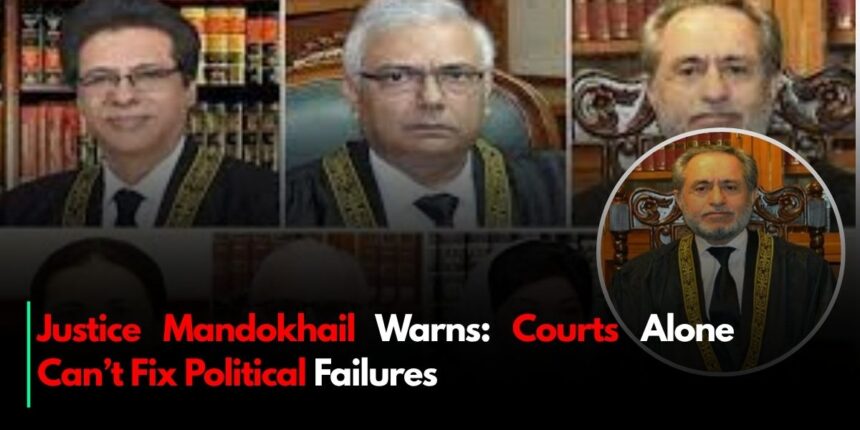Justice Jamal Khan Mandokhail of the Supreme Court made it quite apparent at a recent hearing that the courts can’t repair problems that politicians won’t fix themselves. His harsh words drew attention to a problem that is still going on: politicians are more inclined to convert conflicts into courtroom drama than to deal with them through laws or executive action.
Justice Mandokhail and his two colleagues on a three-member bench recently warned that politicians are going to court more and more instead of settling their differences in a democratic way. He said, “It is not a good tradition to file cases against each other,” and he advised leaders to use political institutions instead of judges. He said that this will keep happening until politicians stop using the courts as backchannels and start dealing with problems head-on.
What judges can’t do
Justice Mandokhail has always told the government and the courts what the Constitution says they can and can’t do. He remembered that judges should only do what the law says they can do when they are not politicians. If they do, the court could “create, not just interpret” constitutional requirements.
His job brings up a touchy subject: should the Supreme Court get involved in politics merely because politicians don’t want to do their jobs? Mandokhail thinks that the courts should not make laws; they should only interpret them.
A Call for Political Responsibility
Chief Justice Athar Minallah of the Islamabad High Court said something like this when he said that Parliament, not courtrooms, should settle problems. Mandokhail’s point is clear: if politicians want to change the laws or how the government works, they should do it in the legislative assembly, not by suing one other.
He says that if judges go too far, they could make it difficult for people to hold their government responsible by creating a culture of judicial activism. People could lose faith in elected institutions if they depend on the courts too much over time.
More important effects on how things are run
Justice Mandokhail is not aiming to limit judicial oversight by asking for this division of duties. Instead, he is telling elected officials to take their jobs seriously. He believes that parliamentarians should make laws, spearhead reforms, and reach agreements instead of putting their problems on hold.
There is a lot of talk right now about judicial overreach and how it impacts the authority of the executive and legislative branches. Mandokhail agrees with others who have said that making the courts the default destination for policy decisions could lead to an uneven and inefficient system.
The Bottom Line: Justice Mandokhail’s statements are a good reminder that the constitution spells out what the courts and politicians are supposed to do. Judges aren’t politicians; they preserve rights and explain the law. When politicians don’t do their duties and instead get embroiled in lawsuits, they damage democracy and throw off the balance of institutions.
Mandokhail’s message is clear: don’t count on the courts to do things that politicians won’t do. Change must come about through democratic processes, debate, and action in the legislature, not lawsuits.








